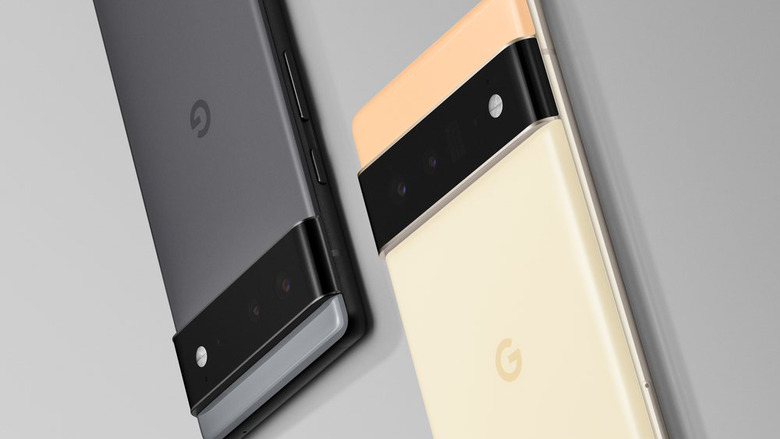Google Tensor Is A Strike For Independence
Google may have given us the first official glimpse of the new Pixel 6 and Pixel 6 Pro, but it's the Google Tensor chipset inside the upcoming Android 12 phones that's arguably more exciting. The company's first homegrown SoC, or system-on-chip, for smartphones, it sees Google take a long-rumored step down a path Apple has already followed.
The Pixel 6 and 6 Pro will be officially unveiled later in the year, Google has said, introducing a new design with a distinctive camera bar running across the rear panel. That will accommodate up to three cameras, in the case of the Pixel 6 Pro, and far from the current, fairly sober colors of the current Pixel line-up there'll be a more eye-catching array of finishes.
The real intrigue, though, is around what's inside. Google has confirmed that the phones will be the first to use its own in-house SoC design, dubbed Google Tensor. Where the Pixel 5 uses a Qualcomm Snapdragon 765, Google has created its own chip for the new handsets.
That's something we've seen Apple make good advantage of with the iPhone and iPad. Tighter integration of iOS and the Apple A-series chipsets has been credited for swifter software updates, better battery life, improvements in performance, and jumps forward in computational photography and more over the years. In short, rather than making software to run on silicon that has been designed to be as flexible as possible for as broad a range of devices as possible, Apple can focus on balancing hardware and software for its own, specific purposes.
It's not hard to see why that would be appealing for Google. The company faced criticism last year when it announced the Pixel 5, for opting for Qualcomm's midrange 7-Series chipset rather than a Snapdragon 8-Series SoC as other flagships did. Its justification was that it could better control power management – among other things – with the more frugal processor, and in the process address a widespread complaint about the previous generation of Pixel smartphones which suffered underwhelming battery life.

Meanwhile, there's a clear advantage to developing your own chip when you have a specific shortlist of key features you'd like to see included. In the case of Google Tensor, that means artificial intelligence (AI) and machine learning (ML). They're things Google has made particular use of in photography.
"The team that designed our silicon wanted to make Pixel even more capable," Rick Osterloh, Senior Vice President of Devices & Services at Google, explains. "For example, with Tensor we thought about every piece of the chip and customized it to run Google's computational photography models. For users, this means entirely new features, plus improvements to existing ones."
AI and ML were already the basis of things like Google's portrait mode, HDR+, computational night time photography, and more. In the past that has tapped a specific Pixel Visual Core in early Pixel phones, and then a Pixel Neural Core in latter ones. Those chipsets sat adjacent to the main SoC, however; Google Tensor should incorporate their talents and replace the main SoC in the process.

It won't just be about coaxing out better photos. Osterloh says that Google Tensor will also allow for improvements in security, with both a new security core and its Titan M2. The SoC will be instrumental in powering new voice recognition features: that should span voice commands, translation, captioning, and dictation, Google has said.
There are some big questions still to be answered, of course. Most obvious is just who will be providing the Pixel 6 and Pixel 6 Pro's modem, expected to be a 5G chipset just like the current Pixel 5.
Being able to develop an SoC is very different to being able to develop a modem, 5G or otherwise. Apple, for example, may have been designing its own A-series chipsets for years now, but it's still yet to launch its own modem. Instead, the iPhone 12 family relies on Qualcomm 5G modems with mmWave support.
Apple is known to be working on its own modems, though they're not likely to be ready for a while yet. Google could be thinking along similar lines, though not for this year's Pixel 6 series. Instead, it seems almost certain that the search giant will be using a Qualcomm modem just like in the Pixel 5.
Nonetheless, this is a bit step for Google. Even if Pixel sales are a small fraction of the overall smartphone market, the series has long been the company's showcase for just what Android can do. With Android 12 debuting Material You as its new interface, and Google Tensor as the powerhouse for its AI/ML features, the Pixel 6 and Pixel 6 Pro will effectively throw down the gauntlet for other Android device-makers to ensure they're delivering their A-game.
